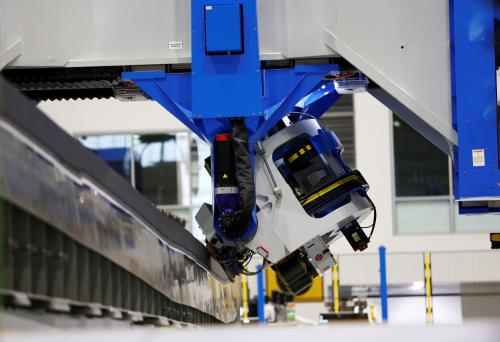If you want more content like this, subscribe to our newsletter.
This week in Class Notes:
-
- Schools with strict suspension policies produce negative outcomes for children, including decreased educational attainment and a greater risk of incarceration in adulthood.
- Mothers’ employment status is strongly correlated with that of their children.
- Advancements in artificial intelligence have the potential to significantly increase productivity, though new forms of digital economic regulation will be required to broadly disseminate the resulting benefits.
- Our top chart shows how radically taxes on the wealthy have fallen over the past 70 years.
- The Washington Post Editorial Board explores President Trump’s interest in combating homelessness.
- An occasional Spotlight section features Rachel Cohen’s piece in The Atlantic outlining the growing body of research debunking the idea that school quality is the primary determinant of economic mobility.
- Finally, check out my op-ed in the New York Times describing how the idea of a meritocracy is serving as fuel for the self-pity of the wealthy.
The school to prison pipeline: Long-run impacts of school suspensions on adult crime
Schools face important policy tradeoffs when monitoring and managing student behavior. Strict disciplinary policies may stigmatize suspended students and expose them to the criminal justice system at a young age. On the other hand, strict discipline may act as a deterrent and limit the negative impact of misbehavior on other students. In this paper, Bacher-Hicks et al. estimate the impact of school discipline on student achievement, educational attainment, and adult criminal activity. The authors find that schools with higher suspension rates have negative long-term effects on students. Students who are quasi-randomly assigned to schools with higher conditional suspension rates are 15 to 20% more likely to be arrested and incarcerated as adults. They are also more likely drop out of school and less likely to attend college. These negative effects are largest for boys and minorities.
The intergenerational correlation of employment: Is there a role for work culture?
In this study, Galassi et al. find a significant positive correlation between the employment status of mothers and their children. After controlling for ability, education, and wealth, a one-year increase in a mother’s length of employment is associated with an average of six more weeks of employment for her child upon reaching adulthood. The intergenerational transmission of maternal employment is stronger to daughters than sons and is greater for poorly-educated and low-income mothers. Potential mechanisms ruled out by the authors include networks, occupation-specific human capital, and conditions within the local labor market. By contrast, strong evidence of a role-model channel is suggested.
Economics of artificial intelligence: Implications for the future of work
The current wave of technological change arising from advancements in artificial intelligence (AI) has created widespread fear of job loss and further rises in inequality. In this paper, Ernst et al. show that large productivity increases can ensue from advancements in AI, particularly for developing countries. At the same time, the authors argue that the risk of further increases in inequality needs to be addressed if the benefits of AI-based technological progress are to be broadly shared. For this, skills policies are necessary but not sufficient. New forms of digital economic regulation will also be required to prevent further rises in market concentration, ensure proper data protection and privacy, and widely disseminate the benefits of productivity growth through profit sharing, digital capital taxation, and a reduction in working time.
Top chart
Drawing on data from Emmanuel Saez and Gabriel Zucman, this week’s top chart shows that taxes on the wealthy have fallen dramatically in recent years. The overall tax rate on the richest 400 households was only 23% last year; their combined tax payments equaled less than one quarter of their total income. The overall rate on the same group was 70% in 1950 and 47% in 1980.

For middle-class and poor families, the picture is different. Federal income taxes have also fallen for this group, but they have hardly benefitted from the decline in the corporate and estate tax. They also pay more in payroll taxes than in the past. The result is that the United States tax system has become significantly less progressive in recent years.
(Saez and Zucman’s paper on progressive wealth taxation was featured in the Fall 2019 edition of the Brookings Papers on Economic Activity. The conference draft of their paper is available here. Criticisms of their findings from AEI’s Michael Strain can be found here.)
Choice opinion
“Federal involvement in helping cities and states deal with the social, economic, and demographic factors of homelessness is long overdue. But it is hard to take Mr. Trump’s interest seriously when his administration has also proposed cutting federal housing dollars and undoing Obama-era rules that aimed to desegregate neighborhoods. Another proposed policy would deny federal housing aid to households that include anyone living in the United States illegally, even when other members are eligible for aid as lawful residents or citizens. And the administration would let homeless shelters refuse shelter to transgender people. Cities have always been an easy target for Mr. Trump. Given that in 2016 he lost the urban vote by almost 2 to 1, he doesn’t see political risk, only political advantage. And that, sad to say, is all that seems to matter to him” writes the Washington Post Editorial Board.
Spotlight
The idea that education is the best way to rise up the income ladder has guided anti-poverty research and political efforts for decades. In The Atlantic, Rachel Cohen highlights a number of studies that complicate this narrative. An important new study from UC Berkeley economist Jesse Rothstein shows that differences in local labor markets and marriage patterns–particularly higher concentrations of single-parent households–have a far-greater impact on children’s future economic standing than school quality. Interfirm inequality, union membership, and geographic location have also all been identified as determinants of economic mobility.
While these results do not suggest that Americans should do away with investments in school improvement, or even that education is unrelated to opportunity, they do underscore the importance of understanding the rationale behind these investments. “If investments in school improvement are being made to boost a child’s chances to out-earn their parents, they are unlikely to be successful” Rothstein concluded.
Self-promotion
In an op-ed for the New York Times, “Now the Rich Want Your Pity, Too“, I address a controversial idea popularized by Daniel Markovits in his new book “The Meritocracy Trap”—namely that the myth of a meritocracy is as painful for those on the top rungs of the ladder as it is for those lower down. The weight of the burdens on the rich, striving to live in the best neighborhoods, attend the most selective institutions, and land the most lucrative jobs is debatable. And in any case, the solution to the problem is simple: just stop.








Commentary
Class Notes: The school to prison pipeline, the economics of AI, and more
Wednesday, October 16, 2019